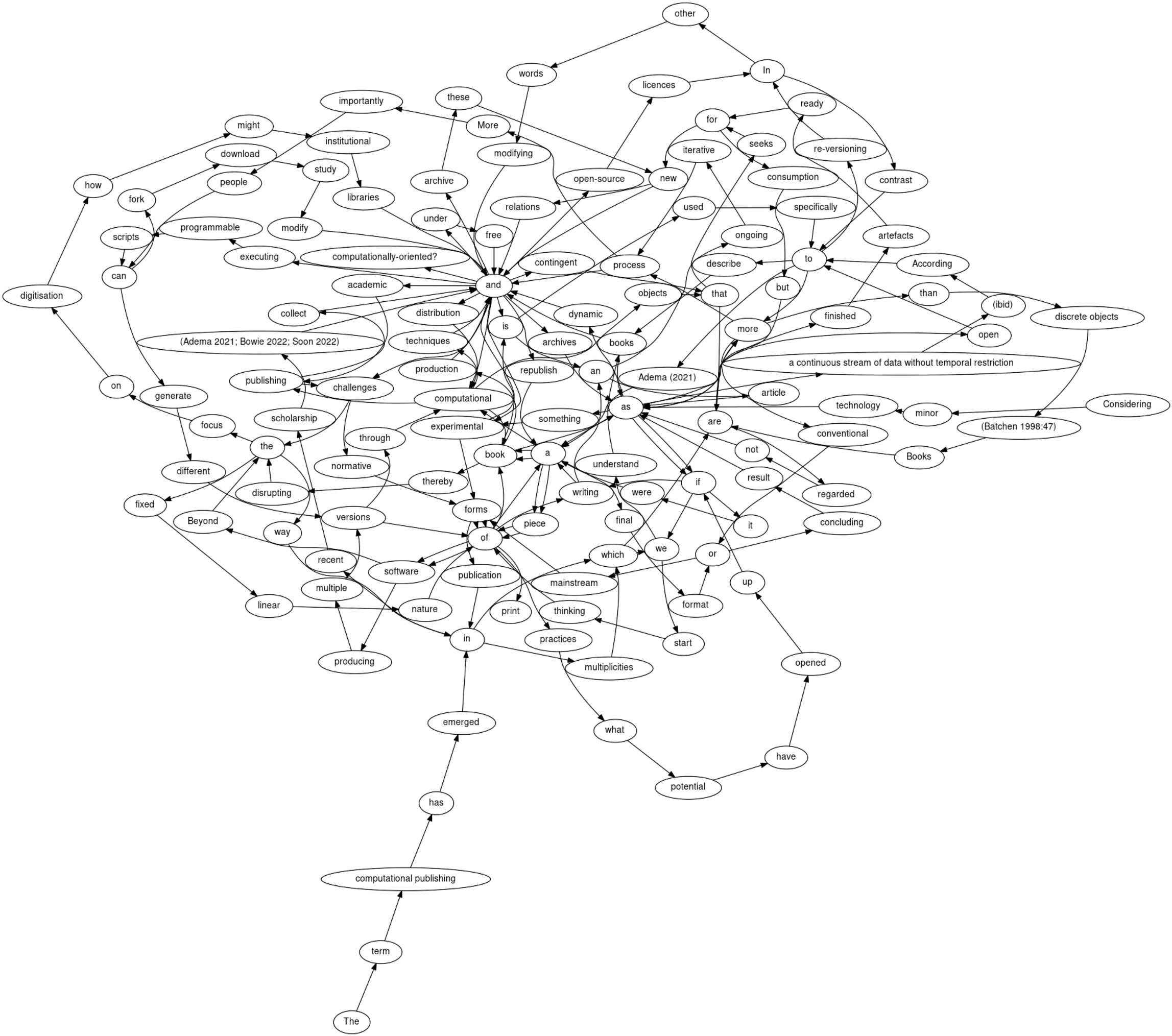Toward a Minor Tech:Soon-500: Difference between revisions
Jump to navigation
Jump to search
No edit summary |
No edit summary |
||
| (20 intermediate revisions by one other user not shown) | |||
| Line 1: | Line 1: | ||
[[Category:Toward a Minor Tech]] | |||
[[Category:500 words]] | |||
'''Writing an Article as if Writing a Piece of Software''' | |||
'''Winnie Soon''' | |||
[[File:Tm_abstract.svg|frame]] | |||
To generate the graph on the left, execute the following code in the terminal with Graphviz installed : <code>dot -Tsvg tm_article.dot -o tm_article.svg</code> | |||
tm_article.dot: | |||
<pre> | |||
digraph G { | |||
graph[overlap=false, splines = true]; | |||
node[fontname="Hershey-Noailles-help-me"] | |||
layout=neato; | |||
- | The->term->"'computational publishing'"->has->emerged->in->recent->scholarship->"(Adema 2021; Bowie 2022; Soon 2022)"->and->is->used->specifically->to->describe->books->as->dynamic->and->computational->objects->that->are->open->to->"re-versioning"->In->contrast->to->more->conventional->or->mainstream->forms->of->book->production->and->distribution->computational->publishing->challenges->the->way->in->which->we->understand->books->and->archives->as->more->than->"'discrete objects'"-> "(Batchen 1998:47)"->Books->are->regarded->not->as->a->final->format->or->concluding->result->as->finished->artefacts->ready->for->consumption->but->as->"'a continuous stream of data without temporal restriction'"->"(ibid)"->According->to->"Adema (2021)"->a->computational->book->is->an->ongoing->iterative->process->More->importantly->people->can->fork->download->study->modify->and->republish->a->book->as->if->it->were->a->piece->of->software->producing->multiple->versions->through->computational->techniques->and->under->free->and->"open-source"->licences->In->other->words->modifying->and->executing->programmable->scripts->can->generate->different->versions->of->a->book->thereby->disrupting->the->fixed->linear->nature->of->print | ||
- | Considering->minor->technology->as->something->experimental->and->contingent->that->seeks->for->new->relations->and->challenges->normative->forms->of->practices->what->potential->have->opened->up->if->we->start->thinking->of->writing->an->article->as->if->writing->a->piece->of->software->Beyond->the->focus->on->digitisation->how->might->institutional->libraries->and->academic->publishing->collect->and->archive->these->new->and->experimental->forms->publication->in->multiplicities->which->are->more->process->and->"computationally-oriented?" | ||
} | |||
</pre> | |||
Latest revision as of 20:07, 23 January 2023
Writing an Article as if Writing a Piece of Software
Winnie Soon
To generate the graph on the left, execute the following code in the terminal with Graphviz installed : dot -Tsvg tm_article.dot -o tm_article.svg
tm_article.dot:
digraph G {
graph[overlap=false, splines = true];
node[fontname="Hershey-Noailles-help-me"]
layout=neato;
The->term->"'computational publishing'"->has->emerged->in->recent->scholarship->"(Adema 2021; Bowie 2022; Soon 2022)"->and->is->used->specifically->to->describe->books->as->dynamic->and->computational->objects->that->are->open->to->"re-versioning"->In->contrast->to->more->conventional->or->mainstream->forms->of->book->production->and->distribution->computational->publishing->challenges->the->way->in->which->we->understand->books->and->archives->as->more->than->"'discrete objects'"-> "(Batchen 1998:47)"->Books->are->regarded->not->as->a->final->format->or->concluding->result->as->finished->artefacts->ready->for->consumption->but->as->"'a continuous stream of data without temporal restriction'"->"(ibid)"->According->to->"Adema (2021)"->a->computational->book->is->an->ongoing->iterative->process->More->importantly->people->can->fork->download->study->modify->and->republish->a->book->as->if->it->were->a->piece->of->software->producing->multiple->versions->through->computational->techniques->and->under->free->and->"open-source"->licences->In->other->words->modifying->and->executing->programmable->scripts->can->generate->different->versions->of->a->book->thereby->disrupting->the->fixed->linear->nature->of->print
Considering->minor->technology->as->something->experimental->and->contingent->that->seeks->for->new->relations->and->challenges->normative->forms->of->practices->what->potential->have->opened->up->if->we->start->thinking->of->writing->an->article->as->if->writing->a->piece->of->software->Beyond->the->focus->on->digitisation->how->might->institutional->libraries->and->academic->publishing->collect->and->archive->these->new->and->experimental->forms->publication->in->multiplicities->which->are->more->process->and->"computationally-oriented?"
}
